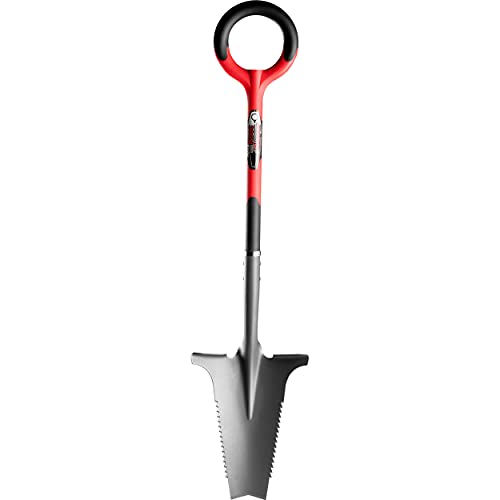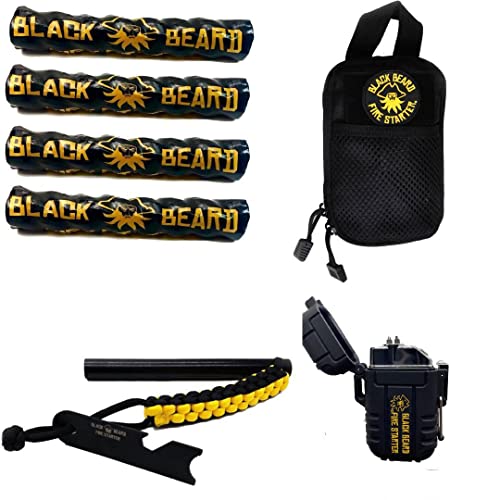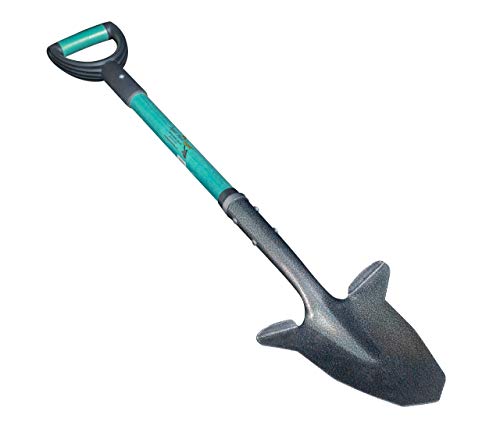




Welcome to our guide on how to effectively use an Irish shovel. Whether you are a seasoned gardener or a beginner, using an Irish shovel can greatly simplify your digging tasks. The Irish shovel, also known as the Irish spade, is a versatile tool that has been used in Ireland for generations. Its unique design and long handle make it perfect for digging deep holes, turning soil, and even removing roots. In this article, we will walk you through the steps of using an Irish shovel and share some tips to help you get the most out of your tool.
When it comes to using an Irish shovel, one of the most important things to keep in mind is your posture. The long handle of the Irish shovel allows you to stand upright while digging, which reduces strain on your back and muscles. Start by gripping the handle firmly with both hands, with one hand closer to the shovel head and the other further down the handle. This will give you better control over the tool and make it easier to dig with precision.
Once you have a good grip on the Irish shovel, place the shovel head on the ground where you want to start digging. Use your foot to apply pressure to the shovel head, pushing it into the ground. As you push down, lean your weight onto the handle and use your body to help drive the shovel into the soil. This will make digging easier and more efficient, especially in tough soil or when dealing with roots.
As you dig, remember to use your body weight to your advantage. Instead of relying solely on your arm strength, use your legs and core muscles to provide power to your shovel. This will not only make the digging process easier, but also help prevent fatigue and strain on your muscles. Additionally, be sure to take breaks when needed and listen to your body. Gardening can be a physically demanding activity, so it’s important to pace yourself and take care of your body.
Choosing the Right Type of Irish Shovel
When it comes to using an Irish shovel, it’s important to choose the right type for your specific needs. There are several factors to consider when selecting the right shovel, including the size and shape of the blade, the handle material, and the overall durability of the tool.
One of the first things to consider is the size and shape of the blade. Irish shovels come in various sizes, ranging from small garden shovels to larger construction shovels. The size of the blade you choose will depend on the type of work you plan to do. If you’re primarily using the shovel for gardening or landscaping, a smaller blade may be more suitable. However, if you’re working on larger construction projects or need to move heavy materials, a larger blade may be necessary.
The material of the shovel handle is another important factor to consider. Handles can be made from a variety of materials, including wood, fiberglass, and steel. Wood handles are traditional and offer a comfortable grip, but they are susceptible to cracking and breaking over time. Fiberglass handles are lightweight and durable, making them a good choice for heavy-duty use. Steel handles are extremely strong and resistant to bending, but they may be less comfortable to grip for extended periods.
Durability is also a key consideration when choosing an Irish shovel. Look for a shovel that is made from high-quality materials and has a strong construction. Pay attention to the connection between the blade and the handle, as this is a common weak point in shovels. A shovel with a reinforced connection will be more durable and able to withstand heavy use.
Finally, consider your own physical abilities and preferences when choosing a shovel. Make sure the shovel is the right weight for you and that the handle length is comfortable to hold. It may be helpful to try out different shovels in person before making a decision.
| Factors to Consider: | Recommended Type: |
|---|---|
| Small-scale gardening or landscaping | Shovel with a smaller blade |
| Large construction projects or heavy material moving | Shovel with a larger blade |
| Comfortable grip and traditional feel | Shovel with a wood handle |
| Lightweight and durable for heavy-duty use | Shovel with a fiberglass handle |
| Extreme strength and resistance to bending | Shovel with a steel handle |
By considering these factors and choosing the right type of Irish shovel, you can ensure that you have a tool that is well-suited to your needs and will withstand the test of time.
Digging Holes with an Irish Shovel
When it comes to digging holes, an Irish shovel can be a versatile tool. Known for its durability and strength, an Irish shovel is a great option for various outdoor digging tasks. Whether you are planting trees, installing fence posts, or digging a trench, using an Irish shovel can make the job easier and more efficient.
Choosing the Right Irish Shovel
Before you start digging, it’s important to choose the right Irish shovel for the job. There are different types of Irish shovels available, including square-mouth and round-mouth shovels. Square-mouth shovels are ideal for digging straight-sided holes, while round-mouth shovels are better suited for digging curved or sloping holes.
Additionally, consider the handle length and material when selecting an Irish shovel. Longer handles provide better leverage, but shorter handles can be easier to control in tight spaces. It’s also important to choose a shovel with a sturdy and comfortable handle, such as one made of durable wood or fiberglass.
Techniques for Digging Holes
When using an Irish shovel to dig a hole, start by marking the area where you want the hole to be. Use a tape measure or string to ensure the hole is the correct size and shape. Then, position yourself behind the shovel with your feet shoulder-width apart, and grip the handle firmly with both hands.
Place the blade of the shovel into the ground at a slight angle, and push it into the soil using your foot to create the initial hole. To remove the soil, tilt the shovel backward and lift it out of the ground. Repeat this process, gradually making the hole deeper and wider as needed.
It’s important to use your leg muscles and body weight to leverage the shovel, rather than relying solely on arm strength. This will help prevent strain and fatigue throughout the digging process. If you encounter hard or rocky soil, use the tip of the shovel to break it up before removing it from the hole.
| Tips for Using an Irish Shovel |
|---|
| • Take breaks when needed to prevent overexertion. |
| • Always wear protective gloves and footwear. |
| • Consider using a wheelbarrow to remove the excavated soil. |
| • Keep the shovel blade clean and sharp for optimal digging performance. |
By following these techniques and tips, you can effectively dig holes with an Irish shovel. Remember to always use caution and take breaks when needed to prevent injury. Happy digging!
Clearing Debris and Soil with an Irish Shovel
If you need to clear debris or soil from your garden, an Irish shovel can be a useful tool to have. This traditional shovel is designed for heavy-duty tasks and is perfect for moving large amounts of material. Here are some steps to follow when using an Irish shovel for clearing debris and soil:
- Assess the area: Before you begin, take a moment to survey the area and identify any obstacles or hazards that may impede your progress. This will help you plan your approach and ensure your safety.
- Prepare your shovel: Ensure that your Irish shovel is in good working condition. Check for any loose or damaged parts, and tighten or repair as necessary. Make sure the shovel blade is clean and free from any dirt or debris.
- Start at one edge: Begin by working from one edge of the area and gradually move towards the opposite side. This will allow you to clear debris and soil in a systematic manner and prevent any missed spots.
- Use proper technique: When using an Irish shovel, it’s important to use proper technique to avoid injury. Bend your knees and keep your back straight to minimize strain on your lower back. Use your legs and core muscles to lift and move the shovel, rather than relying solely on your arms.
- Remove debris: As you work your way through the area, use the shovel to scoop up any debris or loose soil. Lift the shovel and dump the materials into a wheelbarrow or designated area for disposal.
- Level the soil: Once the debris has been cleared, use the shovel to level the soil and create a smooth surface. This will prepare the area for any further gardening tasks, such as planting or landscaping.
- Clean and store the shovel: After you have finished using the Irish shovel, rinse off any remaining dirt or debris and allow it to dry before storing. Store the shovel in a dry place to prevent rust and damage.
By following these steps, you can effectively clear debris and soil from your garden using an Irish shovel. Remember to take breaks as needed, stay hydrated, and work at a pace that is comfortable for you. Happy gardening!
Maintaining and Storing an Irish Shovel
Proper maintenance and storage of your Irish shovel can help prolong its lifespan and ensure its effectiveness when you need it most. Here are some tips to keep in mind:
Cleaning: After each use, make sure to clean off any dirt or debris from the shovel. Use a garden hose or a bucket of water to rinse it off. For tough, caked-on dirt, you can use a brush or a putty knife to scrape it off.
Drying: After cleaning, it is important to allow the shovel to dry thoroughly before storing it. A damp shovel can promote rust and corrosion. Wipe it down with a dry cloth or let it air dry in a well-ventilated area.
Rust prevention: To prevent rust from forming on your Irish shovel, you can apply a thin coat of oil or a rust inhibitor. Simply rub the oil onto the metal parts of the shovel and let it soak in before wiping off any excess. This will help protect the shovel from the effects of moisture and humidity.
Sharpening: Over time, the blade of your Irish shovel may become dull. You can sharpen it using a file or a grinding stone. Make sure to follow the manufacturer’s instructions and take proper safety precautions when sharpening the blade.
Storing: When storing your Irish shovel, make sure to keep it in a dry and secure location. Avoid leaning it against a wall or leaving it exposed to the elements, as this can cause unnecessary wear and tear. Consider using a rack or a hook to hang the shovel on the wall or keep it stored in a shed or garage.
Regular inspections: It is a good idea to regularly inspect your Irish shovel for any signs of damage or wear. Check for loose parts, cracks in the handle, or any other issues that may affect its performance. If you notice any problems, take the necessary steps to repair or replace the shovel as needed.
By following these tips, you can ensure that your Irish shovel remains in good condition and ready for use whenever you need it. Proper maintenance and storage will help you get the most out of your shovel and make your gardening or digging tasks easier and more efficient.






